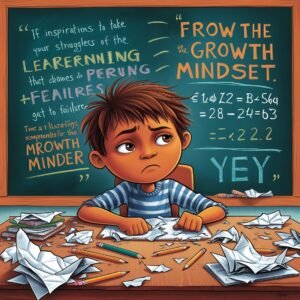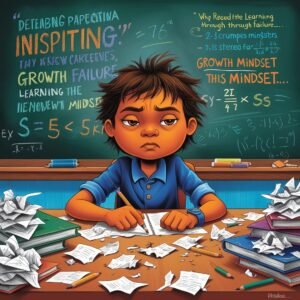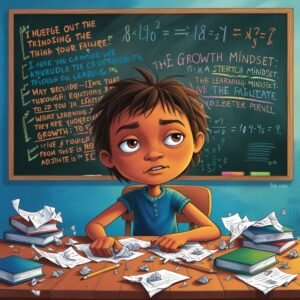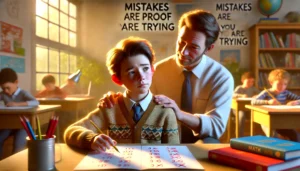Learning Through Failure: The Power of a Growth Mindset in Youth
Learning Through Failure: The Power of a Growth Mindset in Youth
Failure often carries a negative connotation. It’s something many of us are conditioned to avoid at all costs. But what if failure is not the end but the beginning of growth? For young people, adopting a growth mindset—the belief that abilities and intelligence can improve through hard work and perseverance—can turn failures into stepping stones for success.
This blog explores the importance of a growth mindset, how failure fosters resilience, and actionable tips for parents, educators, and mentors to help youth embrace setbacks as opportunities.
What is a Growth Mindset?
Psychologist Carol Dweck introduced the idea of a growth mindset, which contrasts with a fixed mindset:
- Fixed Mindset: The belief that intelligence and talent are unchangeable traits. Individuals with this mindset often shy away from challenges, fearing failure will expose their limitations.
- Growth Mindset: The belief that abilities can be developed with effort, learning, and persistence. People with this mindset view challenges as opportunities to grow.
For young people, adopting a growth mindset opens the door to curiosity, resilience, and continuous learning.
Why Failure is Essential for Growth
Failure isn’t a roadblock—it’s a critical part of the journey. Here’s why embracing it matters for youth:
- Builds Resilience: Facing and overcoming failures teaches young people how to persevere during tough times.
- Develops Problem-Solving Skills: Mistakes push us to rethink our strategies and approach challenges creatively.
- Improves Emotional Intelligence: Dealing with failure helps youth manage disappointment and frustration.
- Encourages Lifelong Learning: When failure is normalized, it reinforces that growth is ongoing and achievable.
How to Teach Youth the Power of Failure
Helping young people embrace failure starts with changing how we, as adults, talk about and react to setbacks. Here are practical strategies:
1. Reframe Failure as a Step Forward
Teach children to see failure as a chance to learn. For instance, instead of saying, “You failed the test,” say, “You didn’t pass this time, but now you know what to focus on for next time.”
2. Model Growth Mindset Behavior
Children learn by example. Share your own failures and how you overcame them. Show them that mistakes are part of success.
Example:
- “When I struggled to solve a work problem, I researched, asked for advice, and kept trying until I found a solution.”
3. Celebrate Effort Over Results
Focus on rewarding the process, not just the outcome. Praise persistence, creativity, and dedication, even if the final result isn’t perfect.
Say:
- “I’m proud of how hard you worked on that project,” instead of “You’re so talented.”
4. Encourage Healthy Risk-Taking
Let youth try new things without fear of judgment. Celebrate the courage to attempt something difficult, even if the results aren’t flawless.
5. Use the Word “Yet”
Add the word “yet” to help shift perspectives.
- Instead of “I can’t do this,” encourage, “I can’t do this yet.”
This small tweak reinforces that growth is possible with time and effort.
6. Provide Constructive Feedback
Offer feedback that helps them grow. Be specific, actionable, and positive.
Example:
- “Your essay has great ideas. Let’s work on organizing the paragraphs to make them even stronger.”
How Schools Can Support a Growth Mindset
Schools play a critical role in fostering a growth mindset. Unfortunately, many traditional systems reward perfection and penalize mistakes. Here’s how schools can shift this paradigm:
- Focus on Mastery Over Grades: Encourage progress and understanding rather than penalizing errors.
- Promote Project-Based Learning: Hands-on activities allow students to learn through trial and error.
- Include Reflection Activities: Encourage students to reflect on their failures and identify lessons learned.
By creating a safe space for experimentation, schools can make failure a normalized and valuable part of learning.
Inspiring Stories of Turning Failure into Success
Young people often relate deeply to real-life success stories. Share these examples to inspire perseverance:
- Michael Jordan: Cut from his high school basketball team, he used that failure to fuel his determination, eventually becoming one of the greatest athletes in history.
- J.K. Rowling: Rejected by multiple publishers, she persisted and introduced the world to the Harry Potter series.
- Thomas Edison: Known for saying, “I have not failed. I’ve just found 10,000 ways that won’t work,” during his journey to invent the lightbulb.
These stories remind us that failure isn’t the opposite of success—it’s part of the process.
Breaking Down Barriers to Embracing Failure
Despite the benefits, many youth still fear failure due to societal pressures and high expectations. Here’s how to help them overcome these challenges:
- Normalize Conversations About Failure: Openly discuss setbacks to reduce the stigma.
- Create Supportive Environments: Ensure young people feel safe to take risks and fail without fear of judgment.
- Challenge Perfectionism: Teach that perfection isn’t achievable, but progress always is.
Why a Growth Mindset Matters Long-Term
The benefits of a growth mindset go far beyond academics. Youth who embrace challenges and learn from setbacks develop:
- Stronger Emotional Resilience: They face life’s challenges with confidence and adaptability.
- Successful Careers: They excel by learning from feedback and adapting to new roles or industries.
- A Love for Learning: They remain curious, open-minded, and willing to grow at every stage of life.
Conclusion
Failure doesn’t have to be feared. It’s a natural part of growth and learning. By teaching youth to embrace setbacks through a growth mindset, we empower them to unlock their potential, face challenges with confidence, and strive for continuous improvement.
As parents, educators, and mentors, it’s our responsibility to model this mindset, normalize failure, and celebrate the courage to try. When youth understand that success is built on a foundation of lessons learned from failure, they become unstoppable.
So let’s reframe failure—not as the end, but as the beginning of something incredible.




